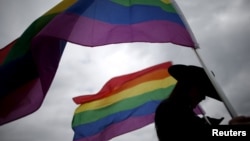The Arkansas Supreme Court on Thursday struck down a city's ordinance banning discrimination based on a person's sexual orientation or gender identity, but it stopped short of saying whether a state law aimed at prohibiting such local LGBT protections is constitutional.
The justices reversed a judge's decision that Fayetteville's anti-discrimination ordinance didn't violate a state law prohibiting cities from enacting protections not covered by state law. Fayetteville, a liberal enclave in northwestern Arkansas, is one of several cities that approved local protections for lesbian, gay, bisexual and transgender people in response to the 2015 law.
Arkansas' civil rights law doesn't cover sexual orientation or gender identity. In the unanimous ruling, justices rejected the argument that Fayetteville and other cities that have enacted such ordinances have made that the protections are covered elsewhere in state law.
The court ruled that these other laws, included an anti-bullying law, aren't related to anti-discrimination laws and don't create new protected classes. They noted that the 2015 law states its intent to have uniform anti-discrimination measures in the state.
"[Fayetteville's ordinance] violates the plain wording of Act 137 by extending discrimination laws in the city of Fayetteville to include two classifications not previously included under state law," the court said. "This necessarily creates a nonuniform nondiscrimination law and obligation in the city of Fayetteville that does not exist under state law."
The justices said they couldn't rule on the law's constitutionality since it wasn't addressed by the lower court, and sent the case back to the Washington County judge who upheld Fayetteville's ordinance. Attorney General Leslie Rutledge's office had asked the court to uphold the state law.
A spokesman for Rutledge and Fayetteville's attorney didn't immediately return calls seeking comment.




